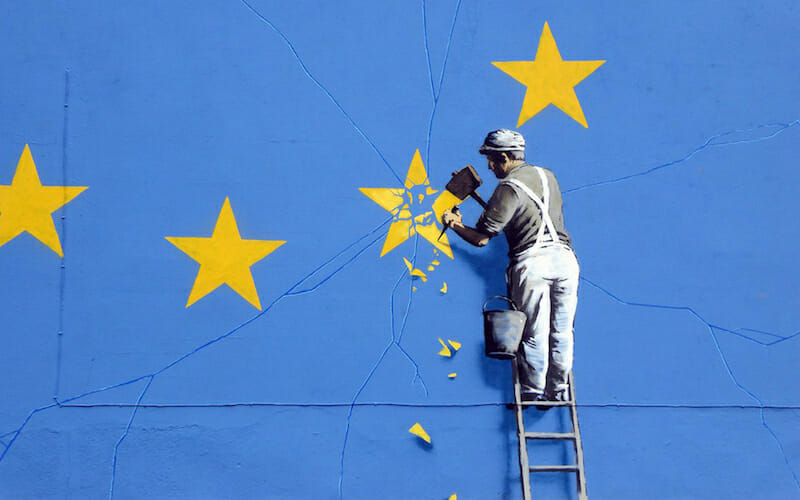
The Origins of Brands and the Fall of the EU
Many intellectuals, jurists, politicians, and analysts clash on a daily basis over the destiny of Europe.
Is Brexit a problem for the UK or for Europe? Do European countries need more Europe or should they totally recover their national sovereignty? What is the European Union? Is it a democratic establishment or a new form of despotism?
These are all questions that could be easily answered with some knowledge of branding, a good comprehension of history, an understanding of anthropological dynamics, and a certain expertise in communication.
Unfortunately, we normally see an overly simplistic approach to the subject among the many who usually debate on the above mentioned issues, whose opinions don’t usually come from an empirical background of evidence but more from the projections of their own beliefs or particular interests.
Let’s try to demonstrate why the EU will collapse in spite of the legit and religious pro-European fervor showcased by unionists’ factions.
In 2004, Al and Laura Ries published a book called The Origin of Brands. In this masterpiece, which traced very important steps in the category, the authors try to explain with reverence to factual dynamics their own thesis: “If you want to build a successful brand, you have to understand divergence. You have to look for opportunities to create new categories by divergence of existing categories. And then you have to become the first brand in this emerging new category.”
The authors derive their studies from Darwin’s Theory of Evolution, which they apply to the analysis of the business world founded, according to their views, on the two main principles expressed by the theory: the survival of the fittest and divergence.
Let’s have a look, for example, on how many business opportunities and powerful brands have derived as a consequence of a divergence from McDonald’s: chicken: Kentucky Fried Chicken; roast beef: Arby’s; hot dogs: Wienerschintzel; coffee: Starbucks; doughnuts: Dunkin’ Donuts; cookies: Mrs. Fields; pizza: Pizza Hut; and, submarine sandwiches: Subway.
But there is a problem, you might think.
Does what works in business make sense in the political arena, if we evaluate the development of events by relying on the biological theory of evolution?
I will provide numerous examples so that you can answer the question for yourself.
More than a two thousand years ago, the Roman Empire was flourishing and its wealth couldn’t be found anywhere else in the world. Under the ambition of Julius Caesar, Rome dominated all of Europe, the North of Africa, and the Middle East. The Roman occupation was brutal and achieved by any means. However, the Roman domain started to crumble as soon as Rome took its power for granted and multiple rebellions led different peoples to claim their independence from the Roman Empire. After a few centuries of indisputable force, the Roman Empire was overthrown by the Visigoths, the Vandals, the Angles, the Saxons, the Franks, the Ostrogoths, and the Lombards. It was just after 1,000 years of absolute domain that, in 476 C.E., the German leader Odoacer became the first barbarian to rule in Rome.
A new form of empire was formed a bit later thanks to the cultural and political domain of the Catholic Church with the aim to restore continental unity. As history tells us, it failed under the pressure of rebellion: that was the Sacred Roman Empire.
Moving away from the ancient world, in 1776 the Declaration of Independence proclaimed the independence of the United States of America from the British Crown after a war led by the American colonies against the army of the mother land.
Remaining on the American continent, a few decades later, Simon Bolivar, celebrated worldwide as The Liberator, led the revolt that allowed territories now known as Venezuela, Bolivia, Colombia, Ecuador, Peru, and Panama to become independent from the Spanish Crown.
While in 1918, we had the definitive collapse of the Austro-Hungarian Empire that dissolved mostly as a consequence of the constant upheavals of peoples now under the Croatian, Hungarian, Czech, German, Italian, Polish, Slovakian, Swiss, and Slovenian flags.
Just after the Second World War, every single overseas empire collapsed under revolts: the British Empire, the French Empire, and the Portuguese Empire were sentenced to death from the restless claims of independence moved by the people once subjugated under them.
Among the most brutal divergence from a unified territory in the 20th century, we had the dissolution of the former Yugoslavia, now composed of Bosnia and Herzegovina, Croatia, the Republic of Macedonia, Montenegro, Serbia, and Slovenia.
At this point you might ask yourself an additional question: what is an empire?
To provide you with a definition I like most, I will refer to the one given by Yuval Noah Harari in his bestseller, Sapiens: “An empire is a political order with two important characteristics. First, to qualify for that designation you have to rule over a significant number of distinct peoples, each possessing a different cultural identity and a separate territory…Second, empires are characterized by flexible borders and a potentially unlimited appetite. They can swallow and digest more and more nations and territories without altering their basic structure or identity.”
And the biggest success of an empire is being able to amalgamate those different identities and structures so that they can become one: “Empires have played a decisive part in amalgamating many small cultures into fewer big cultures…Often enough, it was the empires themselves which deliberately spread ideas, institutions, customs and norms. One reason was to make life easier for themselves. It is difficult to rule an empire in which every little district has its own set of laws, its own form of writing, its own language and its own money. Standardization was a boon to emperors. A second and equally important reason why empires actively spread a common culture was to gain legitimacy.”
But Yuval Noah Harari seems to forget one simple attribute that any empire shares: the process of economic exploitation.
History doesn’t neglect to show us a constant attempt to unify territories but at the same time a tendency to diverge from those unified lands.
Approached from an economic perspective, any process of integration brings with itself a process of economic exploitation. The rulers of an empire who conquer new peoples do not consider those people at the same level as they are, and for this reason they not only proclaim themselves as the incarnation of a superior culture, they also set their own rules.
The British Empire wasn’t built to benefit the African and Asian colonies but to enrich the mother land.
The unification of Italy wasn’t done to benefit the multicultural and folkloristic people of the Southern territories, but to extend the Kingdom of Sardinia and Piedmont with a military invasion and exploit the wealth of the Kingdom of the Two Sicilies and the prosperity of their banks (thus moving them to the Northern regions).
The Nazi attempt to build the Great Germany by conquering Europe on all fronts wasn’t meant to benefit the French, the Italians, the Polish, the Czech, the Belgians, etc., but to recover the German economy from the worst economic recession of all time.
The process of the European integration and the Eurozone itself has benefited only one country as far as we know. That country is Germany. But other once prosperous economies started to decline just after the adoption of the European single currency.
From an anthropological perspective, the European Union has been able to create its own legitimacy around a key pillar of its storytelling: in a globalized economy, single states can no longer sustain economic competition.
Political organizations are an imagined order with the aim to portray themselves not only as the natural course of history but also as the last stage of it. This is how ideology works. Ideology has the aim to draw a more magnificent future than what the present can lead to, and as a result of its acceptance, to create the institutional framework and social hierarchies that will turn that particular vision into the concrete plan of inter-subjective daily life, where it legitimizes and reproduces itself.
However, in this scenario there are two main problems that the empire must face: Divergence (as we have seen, history presents a constant tendency toward divergence: the hunger to extend a domain seems to be always sabotaged by internal revolts); Control (as we know that internal revolts might appear, the empire should be able to install a systematic form of repression. As from the studies by Montesquieu, magnificently expressed in The Spirit of Laws, the wider the territory is, the higher the probability of revolt, and consequently, the higher the efficiency of the military apparatus must be to prevent and suppress those revolts. According to Montesquieu, this scenario has a significant impact on the political organization of the domain, which is neither the democratic way nor the monarchic one, but despotism).
Preparing for the possibility of divergence, any empire or political establishment tries to figure out a way to delegitimize the opponent.
In this undertaking, the Romans used the name Barbarians, the Church used the name Heretics, and sovereign states use the name terrorists, while the EU is referring to the label populists.
But while barbarians, heretics, and terrorists decrease the value perception of the opponent, the label populist increases it.
From a communication perspective, this might be the current political suicide of the EU.
The members of the Eurozone (which is that part of the European Union whose member states have adopted the European single currency) are facing a social disaster with deflating salaries and a rate of unemployment never seen in European history in spite of the bright future the EU was promising.
Thus, when you try to look like the clever guy who calls your opponent populist, you are showcasing three underestimated weaknesses: you are giving an assist to anti-EU movements and political parties as they get democratically elected and wish to be seen as the ones who really care about their own people; you are showing disrespect by offending the intelligence of the same people who elect the governments that pay billions to be members of the EU, being aware that those billions come from the money of the same taxpayers that you consider ignorant and incapable of making their own decisions and you are portraying an elitist version of politics that people dislike because it could never be associated with a democratic view of the political arena but with a totalitarian one based on the direction of a few enlightened men and women.
The European Union will crumble. The European establishment hasn’t been able to match the material expectations of common wealth and prosperity for all the members of the EU. This has significantly reduced the legitimacy that people are giving to the European myth while a new sunrise of divergence is right around the corner with anti-EU movements and political parties now getting considerable consent. If the EU will fail to significantly punish the UK for Brexit in order to set an example (hit one to educate 27), then it will fail even further in demonstrating that Brexit is a political problem of the EU rather than of the single leaders of the member states, and the EU will soon collapse.

